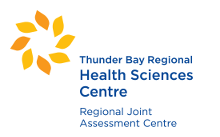About the Regional Joint Assessment Centre
The Regional Joint Assessment Centre (RJAC) helps adults with hip and knee problems that cause pain and difficulty moving. The Program was developed as part of the Ontario Ministry of Health and Long-Term Care’s Wait Time Strategy to improve access to joint replacement surgery and improve care for patients with osteoarthritis.
Arthritis continues to be one of the main sources of hip and knee pain. Osteoarthritis, the most common type of arthritis, usually develops in weight-bearing joints such as the hips and knees. It is sometimes called degenerative arthritis because the cartilage in the joint starts breaking down over time. This is why it tends to occur as we get older. Normally, cartilage acts as a buffer and shock absorber between joints. As the cartilage breaks down, the bones in the joints no longer have that protective layer. This can lead to serious injury causing pain and reducing mobility.
The RJAC provides one point of contact for patients who are referred to the program by their primary care provider or a physician. If your knee or hip pain is stopping you from doing the activities you enjoy, talk to your doctor about getting a referral to RJAC. Although surgery isn’t always the answer for every patient, we can quickly assess your joint pain and determine the best treatment options for your condition. Our goal is to work with you to reduce your pain so that you can stay active.
Locations
RJAC has four locations throughout Northwestern Ontario: Thunder Bay, Dryden, Kenora, and Fort Frances, which are all connected through one centralized referral system. Please visit our Contact page for location contact information.
ISAEC – Interprofessional Spine Assessment and Education Clinics
Besides being painful, low back pain can limit your mobility and stop you from doing everyday tasks. That’s why it’s important to get the help you need, when you need it. The new ISAEC program is an innovative program that speeds up assessment time for patients with low back pain. Patients can get in to see a low back health care professional within four weeks on average.
The ISAEC program speeds up the process in several ways. Rather than an automatic referral to a spine surgeon (which may be unnecessary), patients see an Advanced Practice Provider first. During this initial assessment, the Advanced Practice Provider can refer to surgeon (if necessary), order for diagnostic imaging (if necessary), and provide other treatment options and pain relief tips.
The ISAEC program also provides one point of contact for the patient to make it easier to navigate the system.
More information about patient care in the ISAEC program can be found here:
http://www.isaec.org/for-patients.html
Shoulder Program
The Rapid Access Clinic, as part of the Regional Joint Assessment Centre, now accepts referrals for shoulder pain and dysfunction that is not resolving with typical management. To assist with access to care, an Advanced Practice Physiotherapist will do a comprehensive assessment in a timely manner to aid in determining your appropriate management pathway. This may include further conservative strategies or a referral to an orthopaedic surgeon if warranted. You will be provided with education and have the opportunity to ask questions.
For Health Care Professionals
Primary care providers including family physicians and nurse practitioners must register with the program before they can provide referrals. More information for health care providers about making a referral can be found on our Referrals page. https://rjac.ca/referral-process/
Find out more information about the ISAEC program here:

